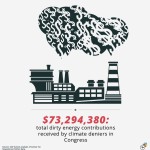Electric Utilities’ Early Knowledge and Ongoing Deception on Climate Change From 1968-2017
 The Energy and Policy Institute just released a new report that traces the electric utility industry’s early knowledge of the climate change risks of burning fossil fuels as far back as the 1960s:
The Energy and Policy Institute just released a new report that traces the electric utility industry’s early knowledge of the climate change risks of burning fossil fuels as far back as the 1960s:
http://www.energyandpolicy.org/utilities-knew-about-climate-change/
The report also shows how despite this early knowledge, some electric utility interests chose to engage in ongoing efforts to sow doubt about climate science and block legal limits on carbon dioxide emissions from power plants.
This trend is especially disturbing in light of the fact that the recently published list of potential names for the Science Advisory Board and the EPA Clean Air Scientific Advisory Committee includes many industry representatives and consultants. The panels are typically composed primarily of independent academics and researchers charged with reviewing agency science and advising the Environmental Protection Agency on major policy decisions.
While industry has always had a voice on those panels, comments from the Trump administration and the potential new appointees suggest the balance may soon change in favor of greater power for regulated companies, particularly the oil and gas industries.
The list of potential new advisory board members includes officials from Exxon Mobil, Phillips 66, Alcoa, Noble Energy, Total, and the American Chemistry Council, a lobbying group for the chemical industry.
Here are a few of the key findings from the Energy and Policy Institute’s report:
- Scientists had begun to warn the electric utility industry about climate change as early as 1968
- Electric utilities knew enough about climate change by 1971 to include research into the “effects of CO2” in the industry’s long-term research and development goals for through the year 2000
- Utilities, through the largely customer funded Edison Electric Institute and Electric Power Research Institute, sponsored some cutting edge climate research during the 1970s and 1980s
- EPRI – the electric utility industry’s official R&D organization – acknowledged a “growing consensus” on climate change among scientists in 1988
- Just one year later, in 1989, efforts by some electric utility interests to sow doubt about climate science began with the formation of the Global Climate Coalition
- In 2017, some electric utilities continue to back special interest groups – including the American Coalition for Clean Coal Electricity, American Legislative Exchange Council, U.S. Chamber of Commerce, and Utility Air Regulatory Group – that attack climate science and/or oppose legal limits on CO2 emissions from power plants
- Thomas Fanning, the CEO of Southern Company, still denied that CO2 emissions are a primary contributor to climate change during a 2017 interview with CNBC. At the time, Fanning was also the chairman of the Edison Electric Institute
Read this report and join the conversation on Twitter using the hashtag: #UtilitiesKnew